| Listing 1 - 10 of 37 | << page >> |
Sort by
|
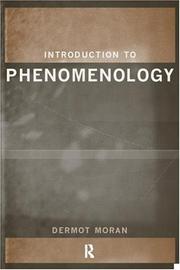
ISBN: 0415183731 0415183723 Year: 2001 Publisher: London : Routledge,
Abstract | Keywords | Export | Availability | Bookmark
 Loading...
Loading...Choose an application
- Reference Manager
- EndNote
- RefWorks (Direct export to RefWorks)
Theory of knowledge --- Phenomenology. --- Phenomenology --- Philosophy, Modern
Multi
ISBN: 9780521719698 9780521895361 9781139025935 9781139549202 1139549200 1139025937 1283610795 9781283610797 9781139554169 1139554166 0521895367 0521719690 1316089193 113956403X 9786613923240 1139550454 1139555413 1139551701 Year: 2012 Publisher: Cambridge [England] ; New York : Cambridge University Press,
Abstract | Keywords | Export | Availability | Bookmark
 Loading...
Loading...Choose an application
- Reference Manager
- EndNote
- RefWorks (Direct export to RefWorks)
The Crisis of the European Sciences is Husserl's last and most influential book, written in Nazi Germany where he was discriminated against as a Jew. It incisively identifies the urgent moral and existential crises of the age and defends the relevance of philosophy at a time of both scientific progress and political barbarism. It is also a response to Heidegger, offering Husserl's own approach to the problems of human finitude, history and culture. The Crisis introduces Husserl's influential notion of the 'life-world' - the pre-given, familiar environment that includes both 'nature' and 'culture' - and offers the best introduction to his phenomenology as both method and philosophy. Dermot Moran's rich and accessible introduction to the Crisis explains its intellectual and political context, its philosophical motivations and the themes that characterize it. His book will be invaluable for students and scholars of Husserl's work and of phenomenology in general.
Husserl, Edmund --- Science --- History --- Phenomenology --- Philosophy --- Husserl, Edmund, --- Phenomenology. --- Philosophy. --- Normal science --- Philosophy of science --- Philosophy, Modern --- History, Modern --- Arts and Humanities --- Science - Philosophy --- History - Philosophy --- Husserl, Edmund, - 1859-1938 - Krisis der europäischen Wissenschaften und die transzendentale Phänomenologie
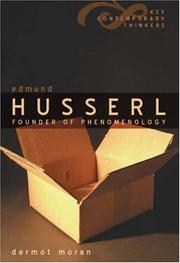
ISBN: 0745621228 074562121X 9780745621227 9780745621210 Year: 2005 Volume: *10 Publisher: Cambridge: Polity press,
Abstract | Keywords | Export | Availability | Bookmark
 Loading...
Loading...Choose an application
- Reference Manager
- EndNote
- RefWorks (Direct export to RefWorks)
Husserl, Edmund --- Husserl, Edmund, --- #SBIB:1H20 --- #SBIB:1H60 --- Metafysica en wijsgerige godsleer --- Taalfilosofie --- Husserl, Edmond --- Husserl, Edmund, - 1859-1938
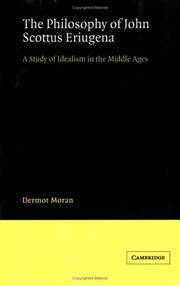
ISBN: 0521892821 Year: 2004 Publisher: Cambridge : Cambridge University Press,
Abstract | Keywords | Export | Availability | Bookmark
 Loading...
Loading...Choose an application
- Reference Manager
- EndNote
- RefWorks (Direct export to RefWorks)
Philosophy, Medieval. --- Idealism. --- Philosophie médiévale --- Idéalisme --- Erigena, Johannes Scotus, --- Philosophie médiévale --- Idéalisme

ISBN: 0521345499 9780521892827 9781139172080 9780521345491 0521892821 1139172085 Year: 1989 Publisher: Cambridge: Cambridge university press,
Abstract | Keywords | Export | Availability | Bookmark
 Loading...
Loading...Choose an application
- Reference Manager
- EndNote
- RefWorks (Direct export to RefWorks)
This work is a substantial contribution to the history of philosophy. Its subject, the ninth-century philosopher John Scottus Eriugena, developed a form of idealism that owed as much to the Greek Neoplatonic tradition as to the Latin fathers and anticipated the priority of the subject in its modern, most radical statement: German idealism. Moran has written the most comprehensive study yet of Eriugena's philosophy, tracing the sources of his thinking and analyzing his most important text, the Periphyseon. This volume will be of special interest to historians of mediaeval philosophy, history, and theology.
Philosophy, Medieval. --- Idealism. --- Erigena, Johannes Scotus, --- Idealism --- Philosophy, Medieval --- #GROL:SEMI-1-05'08' Joan --- Medieval philosophy --- Scholasticism --- Animism --- Monism --- Personalism --- Philosophy --- Positivism --- Dualism --- Materialism --- Realism --- Transcendentalism --- Erigena, Johannes Scotus --- Erigena, Joannes Scotus, --- Erigène, Jean Scot, --- Eriugena, Giovanni Scoto, --- Eriugena, Joannes Scotus, --- Eriugena, Johannes Scotus, --- Eriugena, John Scottus, --- Eriugena, Scoto, --- Eriugena, Yohanesu Sukotusu, --- Giovanni Scoto, --- Jean Scot, --- Joannes Scotus, --- Joannes, --- Johannes Scottus, --- Johannes, --- John, --- Scot Erigène, Jean, --- Scot, Jean, --- Scoto, Giovanni, --- Scottus Eriugena, John, --- Scottus, Johannes, --- Scotus Erigena, Johannes, --- Scotus Eriugena, Joannes, --- Scotus Eriugena, Johannes, --- Sukotusu Eriugena, Yohanesu, --- Joannes Scottus Eriugena --- Johannes Scottus Eriugena --- Joannes Scotus Eriugena --- Johannes Scotus Eriugena --- Iohannis Scotti --- Johannes Scotus Erigena --- Eriugena --- Arts and Humanities --- Erigena, Johannes Scotus, - ca. 810-ca. 877
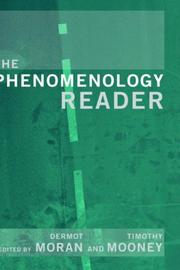
ISBN: 0415224225 0415224217 9780415224222 Year: 2002 Publisher: London: Routledge,
Abstract | Keywords | Export | Availability | Bookmark
 Loading...
Loading...Choose an application
- Reference Manager
- EndNote
- RefWorks (Direct export to RefWorks)
Phenomenology. --- Phenomenology --- Phénoménologie --- Philosophy, Modern
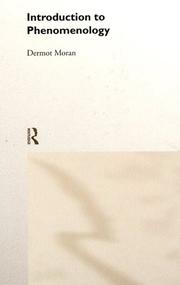
ISBN: 1134671067 0203196635 128032497X 9780203196632 9786610324972 6610324972 9780415183727 0415183723 9780415183734 0415183731 0415183723 0415183731 9781134671014 9781134671052 9781134671069 1134671059 Year: 2000 Publisher: London ; New York : Routledge,
Abstract | Keywords | Export | Availability | Bookmark
 Loading...
Loading...Choose an application
- Reference Manager
- EndNote
- RefWorks (Direct export to RefWorks)
Introduction to Phenomenology is an outstanding and comprehensive guide to phenomenology. Dermot Moran lucidly examines the contributions of phenomenology's nine seminal thinkers: Brentano, Husserl, Heidegger, Gadamer, Arendt, Levinas, Sartre, Merleau-Ponty and Derrida.Written in a clear and engaging style, Introduction to Phenomenology charts the course of the phenomenological movement from its origins in Husserl to its transformation by Derrida. It describes the thought of Heidegger and Sartre, phenomonology's most famous thinkers, and introduces and assesses the distin
Phenomenology. --- Philosophy. --- Mental philosophy --- Humanities --- Philosophy, Modern
Book
Year: 2001 Publisher: London: Routledge,
Abstract | Keywords | Export | Availability | Bookmark
 Loading...
Loading...Choose an application
- Reference Manager
- EndNote
- RefWorks (Direct export to RefWorks)

ISBN: 9780415299367 0415299365 Year: 2008 Publisher: London Routledge
Abstract | Keywords | Export | Availability | Bookmark
 Loading...
Loading...Choose an application
- Reference Manager
- EndNote
- RefWorks (Direct export to RefWorks)
Book
Year: 2005 Publisher: Dublin Humanities institute of Ireland
Abstract | Keywords | Export | Availability | Bookmark
 Loading...
Loading...Choose an application
- Reference Manager
- EndNote
- RefWorks (Direct export to RefWorks)
| Listing 1 - 10 of 37 | << page >> |
Sort by
|

 Search
Search Feedback
Feedback About UniCat
About UniCat  Help
Help News
News